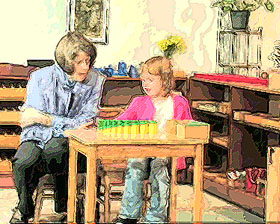
|
| (A Montessori quick bite from The Center for Guided Montessori Studies) |
|
Fathers had little role in child care when Dr. Montessori wrote the passage above, but if we substitute “parent” for mother, the quote still applies. In the last century a liberation of gender has swept through western civilization. Though incomplete, this wave of liberation has swept much faster and further than a similar liberation for childhood. Scientific evidence has long since demonstrated the ineffectiveness of authoritarian treatment of children. Chillingly, some parents and most traditional schools still persist in labeling children “good” or “bad” based on their ability to passively accept arbitrary constraints and to parrot back facts and dogma placed in front of them. Many educators treat children as potential criminals who need to be forcibly “civilized”. As Montessorians, we uncategorically reject this notion. A child’s behavior communicates his or her needs clearly to those who listen. One child may break her toys in order to learn how they work inside. Another may get dirty while exploring the mysteries of nature. A boy may chatter in class because he is unengaged by the work, or because he is simply hungry for social interaction. Consider that social intelligence, like all other kinds, also needs stimulation in order to develop. Is there a disruptive child in your classrooms? Many well-meaning and thoughtful people have suggested that Montessori is not for all children. Others, both idealistic and with great depth of classroom experience, suggest the opposite, that the Montessori classroom is the ideal environment for every youth, and perhaps adult learners as well! We would rather not paint with too broad a brush. Instead, we would suggest that at least many of these more “difficult” children may be able to find a wonderful place within your classrooms. The key is for teacher and parents collaborate to discover – and unlock! – the key of the child’s interest.
Thoughts for the day:
|



